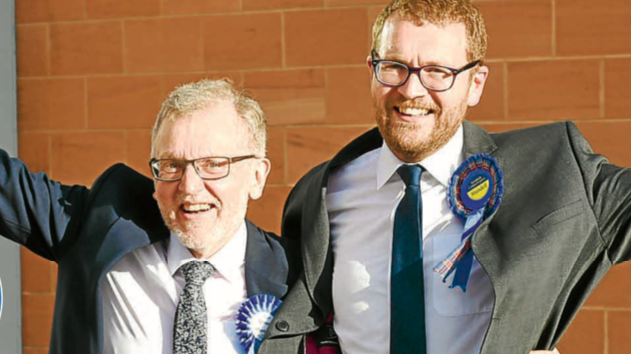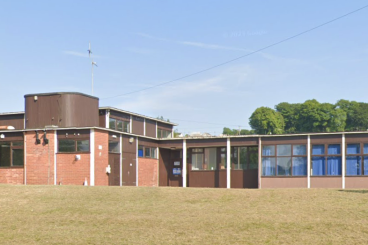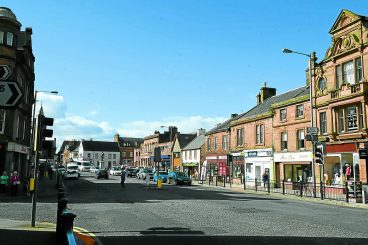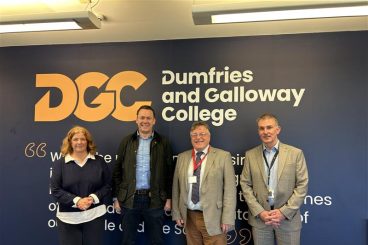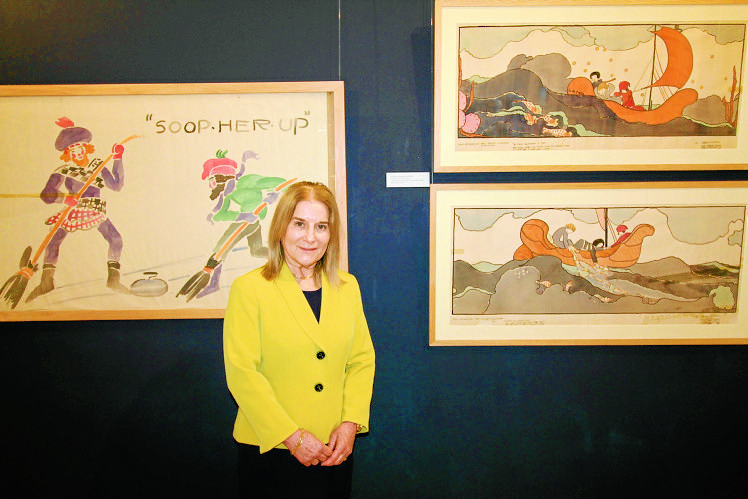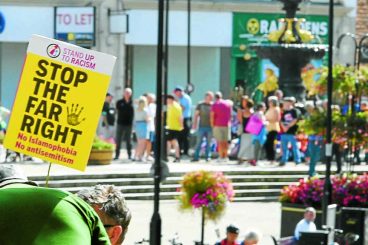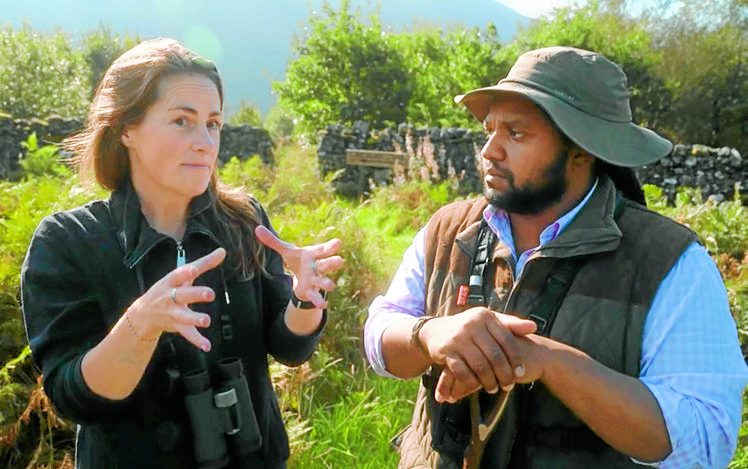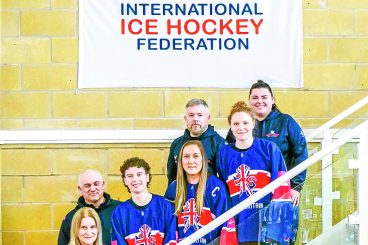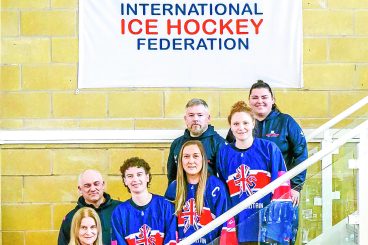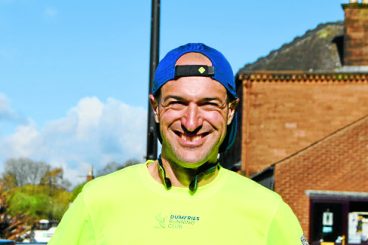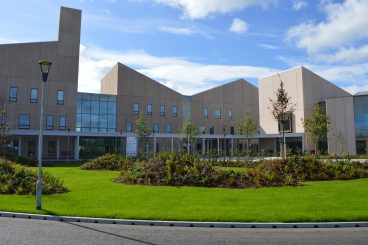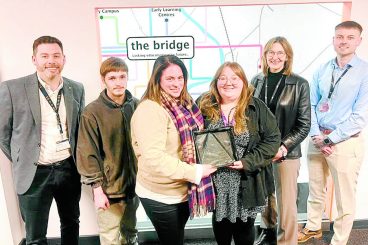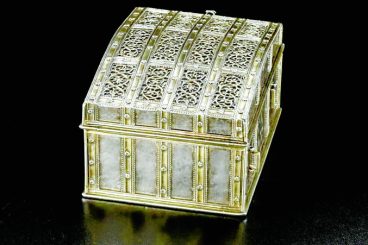VOTERS across Dumfries and Galloway gave a renewed and strengthened mandate to the Conservatives last week — following an election which saw the biggest turnout in both of the region’s Scottish parliamentary constituencies since they were created.
In Dumfriesshire, 66 per cent of eligible voters turned-out, whilst the figure in Galloway and West Dumfries was only slightly lower at 64.9 per cent.
Marginal 2016 victories for the Tories in both seats meant they were eyed up by the SNP in their bid for an overall majority at Holyrood this year.
But despite various excursions by Nicola Sturgeon in her final weeks of campaigning, where she pledged to “prioritise” the region, improve its roads and boost its broadband, SNP hopefuls Joan McAlpine and Emma Harper, who have spent the last five years serving as South Scotland MSPs, failed to swing the party’s 2016 constituency vote shares by 1.7 and 2.3 per cent respectively needed to gain the seats.
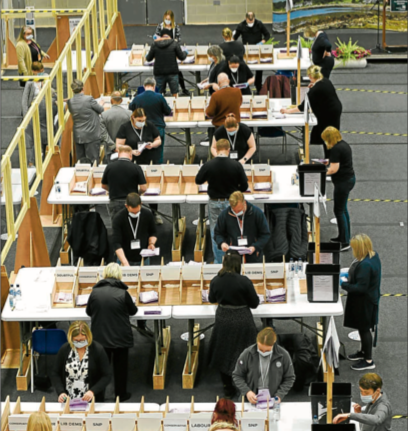
Instead, the Conservatives returned their biggest-ever vote share in the two constituencies — comfortably re-electing Oliver Mundell in Dumfriesshire and Finlay Carson in Galloway and West Dumfries for a further five years.
Both men considerably widened the gap between themselves and their SNP counterparts, however, Mr Mundell — whose 2016 margin of just 1230 (3.4 per cent) has more than tripled to 4066 (ten per cent) — secured a notably bigger majority than Mr Carson, whose 2016 margin of 1514 (4.5 per cent) rose by 1121 to 2635 votes (7.1 per cent).
And it in large part happened as a result of Labour voters in the region lending their ballot to the Tories in a stand against the now likelier prospect of a second independence referendum. Consequently, constituency support for the Labour party bombed locally — dropping 13.8 per cent in Dumfriesshire and 6.7 per cent in Galloway and West Dumfries.
However, a loss of two seats for Labour across the country improved their chances on the list — and the South Scotland region returned one more Labour MSP than in 2016, taking their total to three.
Furthermore, despite failing to turn Dumfries and Galloway yellow, Joan McAlpine and Emma Harper increased their vote shares by 3.8 per cent and 0.9 per cent respectively, demonstrating that whilst the region’s result is a clear show of support for the Conservative party, the union, and the two MSPs who have represented the area since 2016, the number of people who want to see an independent Scotland has also risen in both constituencies since the last election.
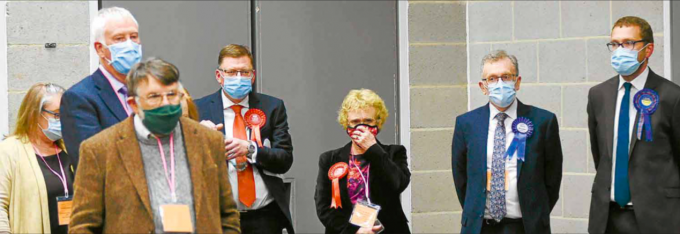
Upon being re-elected, Oliver Mundell pledged to tackle the region’s ageing population by creating more jobs and opportunities for young people.
Voters cast 19,487 ballots in his favour, boosting his 2016 majority by 6.6 per cent.
Mundell is now set to see a decade as the constituency’s MSP, having held the seat since the last election.
After being announced as the victor, he was joined by his dad, David, Dumfriesshire’s current MP and former Scottish Secretary, who joked whilst posing for a photograph: “Oliver has a bigger majority than me”.
The 31-year-old MSP said that he felt “relieved on a personal level” and “pleased for local people”.
He added: “I feel the result represents the very strong feeling in this area that our region is forgotten about, but also that the SNP and their plans for independence ignore what that would mean for people living in this area and the potential for a border at Gretna has weighed very heavy in people’s minds.
“I think there are a lot of people who have supported me in this election who are not traditional Conservative voters who have taken a look at the options and they’ve voted tactically to send a message to Nicola Sturgeon to say that they want to focus on rebuilding the country, not tearing it apart.”
Reacting to the wider result across the country, where the SNP gained two constituencies from the Conservatives, he said: “I feel very sorry for my other colleagues who’ve not done as well and obviously this win’s a boost for morale.”
Asked of his hopes and ambitions for the constituency over the next five year term, Mr Mundell replied: “I think it’s beginning to build on the work that the South of Scotland Enterprise agency is doing and I think the biggest challenge for our area is an ageing population, we see a net outflow of young people and I want to see jobs and opportunities here so that young people have a choice to stay and have their family and live their life in Dumfries and Galloway.”
SNP runner-up Joan McAlpine received 4066 fewer votes whilst still increasing her 2016 share by 3.8 per cent with 15,421 votes.
She commented on Friday that the result “shows that Dumfriesshire doesn’t speak with one voice”.
Ms McAlpine added: “We used to be called the debatable lands and there should be a debate about our future; 15,000 people in Dumfriesshire rejected Boris Johnson’s Tories, they believe that Scotland’s future should be in Scotland’s hands.
“We increased our share of the vote significantly, another 3000 votes added to our total from 2016, so I think everybody has to respect that. I did congratulate Oliver on his success and I look forward to having debates with him and others about the future of Scotland.
“Things are looking good for the party and here in the South of Scotland we made two constituency gains in East Lothian and Ayr and that’s really good news and again it shows that Boris Johnson cannot continue to deny the people Scotland a say on their future.”
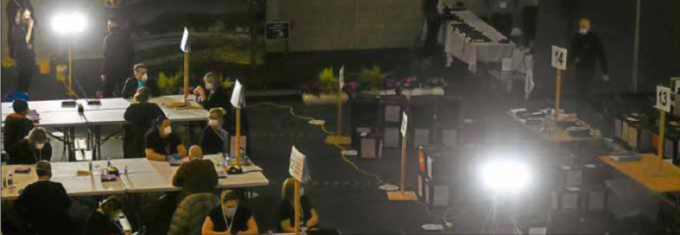
As the final constituency declarations were coming through on Saturday, all eyes were on Galloway and West Dumfries — an SNP target which, if the party had been successful in gaining from the Conservatives, would have brought their total to the 65 seats needed for a majority.
But the electorate of Scotland’s most south-westerly constituency saw fit to re-elect Finlay Carson as their MSP and increase his vote share by 3.5 per cent.
With the rosette of his predecessor Alex Fergusson, the constituency’s MSP from 2007-16, proudly pinned to his suit, Mr Carson said that denying the SNP an overall majority made him feel like “the goalkeeper who blocked the goal”.
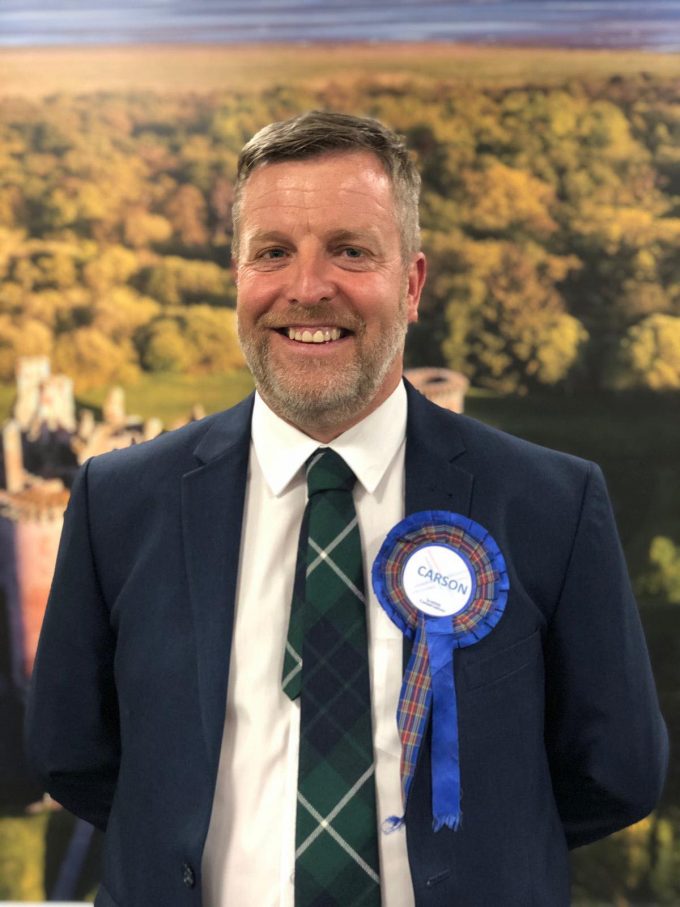
Speaking after the declaration, he said: “It’s certain that Indyref2 played some part in some people’s votes.
“But I do think in large part that people decided that I was best for their MSP because I was challenging some of the decisions that the SNP government made previously over investment in the south-west and particularly in the west of the region in Stranraer, their failure to deliver the £6 million for the waterfront, their failure to improve the A75 as was promised ten years ago, failure to get broadband rolled-out – these are all issues that are really, really important and we need to get them right before we get into any constitutional arguments.
“I’m absolutely delighted to see the vote share increased, I think it’s testament to my staff that have worked in the parliamentary office, they’ve worked tirelessly over the last five years and particularly over the past year helping businesses and individuals cope with the pandemic, ensuring that businesses get the support that they’re due and also personal issues that people have had, whether that’s mental health or access to healthcare – and they’ve worked really hard and a lot of that victory is down to them.”
Mr Carson said it gave him “great satisfaction” knowing he had helped stop the SNP getting across the line, adding: “It’s a bit like when football teams go to penalties; you don’t remember the guys that score all the penalties but you remember the goalkeeper that saves one, and I would like to think I’m that goalkeeper. I’m absolutely delighted that I could play a part in stopping an SNP majority which will wrongly, I believe, give them the ability to shout that they’ve got a mandate to call for Indyref2 and I’m really proud to have played a part in that.”
Meanwhile, Emma Harper’s 14,851 votes increased her 2016 vote share by 0.9 per cent – and despite failing to flip the constituency, she has made it back into Holyrood as the only SNP MSP on the South Scotland regional list.
Furthermore, Labour candidate Archie Dryburgh dropped his party’s share by 6.7 per cent.
And after fielding candidates for the first time ever in Galloway and West Dumfries, the Scottish Green party beat the Liberal Democrats to the fourth spot by 22 votes.
Green candidate Laura Moodie said: “We’ve been actively campaigning in Galloway for quite a long time now and I think that we have our own voters that are conscious about the climate emergency and the need to act on that.”
And on the South Scotland ballot, Labour and the Conservatives have each gained a seat from the SNP.
Nicola Sturgeon’s party held three of the seven regional seats over Holyrood’s previous term, however, as they made gains in three constituencies — and as pockets of pro-independence voters in the region lent their peach ballot to the likes of the Green Party and Alex Salmond’s Alba party — just one South Scotland SNP MSP now remains.
And that seat went to Emma Harper, over colleagues Joan McAlpine and Paul Wheelhouse.
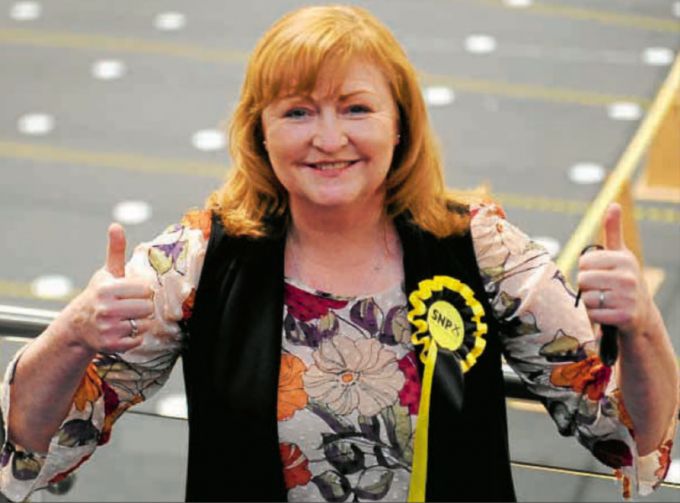
Ms Harper said following her re-election:
“I’m delighted to be returned, I’ve had five years where I think I’ve worked really hard, I’ve actually changed a lot; my livestock bill was passed unanimously, so I’m looking forward to getting back to work straight away.
“I feel a loss for both Paul and Joan, I think we need to look at the fact that we’ve also got three new constituency MSPs.”
Mr Wheelhouse’s seat was snatched by Labour’s Carol Mochan, who joins the re-elected Colin Smyth and the newly-elected former primary teacher Martin Whitfield, who took the third spot on Labour’s South Scotland ballot in place of Claudia Beamish, a regional MSP since 2011.
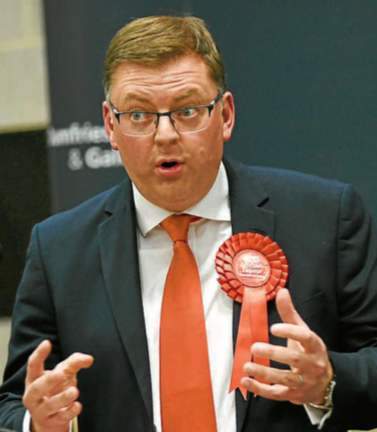
A jubilant Mr Smyth said: “I know just how incredibly tough the last year has been for everybody living here in the south of Scotland — the pandemic has separated us from our friends and families and sadly too many lives and livelihoods have been lost over the past 12 months. So I want to give this commitment on behalf of myself, on behalf of Carol and on behalf of Martin; when we go to the Scottish Parliament, our commitment, our only priority will be to deliver that recovery plan for the south of Scotland.”
The biggest local upset at this year’s election was for Joan McAlpine. After losing-out in Dumfriesshire, the SNP candidate and regional MSP since 2011 failed to make it back into the parliament on the list. Her South Scotland seat went to the Conservatives’ Sharon Dowey, who is taking on the regional role for the first time alongside Haddington Tory councillor Craig Hoy, who has replaced Michelle Ballantyne, an ex-Conservative South Scotland MSP who defected to Reform UK last year.
The two Tory newcomers join the re-elected MSP Brian Whittle, who has represented the electoral region since 2016. Mr Whittle commented: “I’m delighted to have been re-elected as a South Scotland MSP in the incoming parliament alongside two other Scottish Conservative MSPs. I’m excited to get back to work and continue my campaigns to promote a healthy, active lifestyle, deliver better transport infrastructure in South West Scotland, bring more investment into the local economy and more besides.”
Results
Dumfriesshire Constituency:
Galloway and West Dumfries Constituency:
South of Scotland list:
1. Labour: Colin Smyth
2. Conservative: Craig Hoy
3. Labour: Carol Mochan
4. Conservative: Brian Whittle
5. Conservative: Sharon Dowey
6. SNP: Emma Harper
7. Labour: Martin Whitfield





